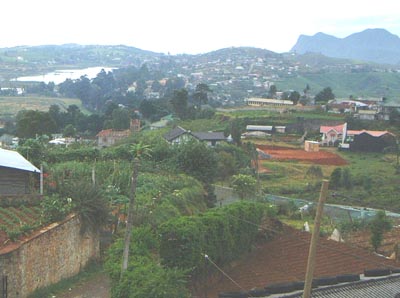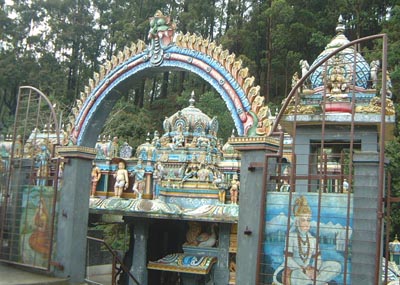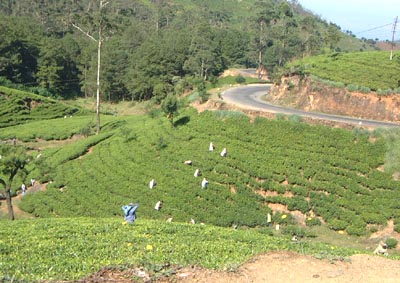Nuwara Eliya
|
|
Nuwara Eliya, (pronounced Noo-ra-lee-ya), the City of Light, is a town in Sri Lanka. It is at an altitude of 1,990 m (6,128 ft) in the central highlands, and is overlooked by Pidurutalagala, the island's highest peak.
The town's altitude means that it has a much cooler climate than the lowlands of Sri Lanka, with a mean annual temperature of 16o rather than the 26o of the coasts. In the winter months it is cold at night, and there can even be frosts, although it rapidly warms up as the tropical sun climbs higher in the sky.
The town was founded by Samuel Baker as a hill retreat for the British in the colonial era, with typically English pastimes including a hunt, polo and cricket.
Many of the buildings retain features from the period, and even new hotels are often built and furnished in the colonial style. The Hill Club is the best preserved of the hotels, and charges admission for non-residents who wish to wallow in its nostalgia. Many private homes still have English-style lawns and gardens.
The town really comes alive in April for the Singhalese and Tamil New Year. Prices triple and it is virtually impossible to find accommodation as affluent Singhalese from Colombo invade the town.
Star attractions at this time are supercross at the Diyatalawa circuit, Formula Three car racing, and horse races. Parties are held nightly in the hotels, and the season culminates in the nine furlong (1811 m) Governor's Cup, and the flower show at the end of the month.
The town's other attractions include golf courses, trout streams, a park, and boating or fishing on Lake Gregory. Country walks include the ascent of Pidurutalagala.
Victoria Park is an attractive and well-used oasis. It is popular with birdwatchers at quieter times because of the good opportunities it gives to see Indian Blue Robin, Pied Thrush or Scaly Thrush lurking in the denser undergrowth. Kashmir Flycatcher is another attractive bird species found in the park. Galway's Land Bird Sanctuary, close to Lake Gregory, is another wildlife site of 0.60 km².
The town is a base for visits to Horton Plains National Park. This is a key wildlife area of open grassy woodland. Species found here include Leopard, Sambar, and the endemic Purple-faced Langur. Endemic highland birds include Dull-blue Flycatcher, Sri Lanka White-eye, and Yellow-eared Bulbul.
The park also has a well-visited tourist attraction at World's End, a sheer precipice with a 1050 m drop. The return walk passes the scenic Baker Falls. Early morning visits are essential, both to see the wildlife, and to view World's End before mists close in during the later part of the morning.
One of the distinctive features of Nuwara Eliya's countryside is the widespread growing of vegetables, fruit and flowers usually associated with temperate Europe. "Little England" has a somewhat incongruous conjunction of terraces growing leeks, beetroot and roses, interspersed with tea bushes on the steeper slopes.
The slow-growing tea bushes of this highland region produce some of the world's finest Orange Pekoe tea, and several tea factories around Nuwara Eliya offer guided tours and the opportunity to sample or purchase their products.
External links
- Tour Sri Lanka's Nuwara Eliya page (http://www.tourslanka.com/Nuwara_Eliya.htm)de:Nuwara Eliya



